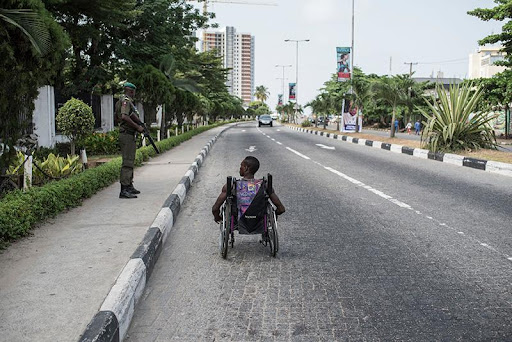Disability-Related Unemployment Widens In Nigeria Despite Legislation
Inaccessible workplace environment, absence of aid devices, and discrimination have continued to widen the disability employment rate gap in Nigeria.

On Monday, Feb. 14, Bello Muhammad, Minister of the Federal Capital Territory (FCT), Nigeria, appointed a visually impaired person, Bature Abubakar, as his technical assistant.
Abubakar’s appointment came after a plea for providing job opportunities for Persons With Disabilities (PwDs) in the ministry, a statement by the National Commission for Persons with Disabilities (NCPWD) explained.
According to the minister, the appointment was to uphold the Disability Act passed in 2019.
This appointment followed the pattern set by Femi Gbajabiamila, Nigeria’s Speaker of the House of Representatives who in 2019, appointed Abdulsalam Idowu Kamaldeen, a PwD law graduate as his Special Assistant on Special Needs and Equal opportunities. Kamaldeen also possesses a degree in Political Science.
But according to many observers and activists fighting for a better living for people with disabilities, these actions of the FCT Minister and that of the House of Representatives Speaker were just like a mere drop in the bucket.
This is because the inequality and other factors limiting the opportunities available to the people living with disabilities are still there while authorities have done little to nothing to better the situation even after the passage of the Disability Act.
Despite Disability Act, nothing is working
According to the Act, all public organisations must reserve at least 5 per cent of employment opportunities for citizens with disabilities.
Usman Limam, a disability rights activist, says passing the bill was not enough.
“We all know what a blind man is, but what does a blind man need to show he is skilled and knowledgeable,” Liman said, asking that more enforcement needs to be made to carry persons with disabilities along.
Liman is visually impaired. He explains that “being disabled does not shield us from having human desires, because I am blind does not mean I will not eat and when we are not employed we have to earn money from other means and some means may not be favourable.”
He said that the awareness of the different types of disabilities and the provision of what they need to show their expertise is lacking.
Liman added that PwDs also have a responsibility to demand the provision of equipment and facilities.
“When these things are not provided in public spaces, we (PwDs) just murmur and leave, but there is a law, and we need to demand what we need.”
Like Liman, Obanye Christopher is a person with physical disability, and uses crutches for mobility. He is self-employed. For him, accessing public and private structures is always a serious task because there are no ramps or PwD friendly facilities in those structures.
All these are supposed to be provided according to the provisions of the Act.
“If there were policies that prohibit discrimination, especially in terms of infrastructure, we would have seen it by now. Offices still do not have wheelchair ramps or elevators, including churches and mosques,” Christopher said.
Since the passage of the Act in 2019, there have been no modifications to the public and private buildings in Nigeria’s capital in Abuja and there are no public transportation systems that have such facilities to accommodate people with disabilities.
Growing disparity
Christopher said people living with disabilities’ frustration regarding unemployment stems from having to prove they are physically capable before proving their expertise.
“Some immediately see you’re physically restricted, and they close their doors.”
The unemployment rate among PwDs is doubling that of the general population in Nigeria.
According to a World Bank report, PwDs are more likely to experience adverse socioeconomic outcomes and face higher multidimensional poverty rates.
The lack of accessibility to workplace assistive devices that are mobility-related and technologically advanced has continued to widen the disability employment rate gap.
This, coupled with the absence of accurate data that demonstrates the number of PwDs in Nigeria, and the different forms of disability, is challenging effective policy surrounding disability issues and development.
Policy implementation in other countries
According to a study carried out by the Leonard Chesire Organisation to better understand the relationship between disability and development in four African countries, Kenya is showing a strong commitment to tackling the problems surrounding disability. However, there have been gaps in funding that have reaped dissatisfaction from households surveyed.
Although there are fewer policies in Zambia than in Kenya, the country is taking greater steps to include PwDs. Still, there is a lack of clarity around budget allocations between ministries even though they have mainstreamed disabilities.
In Uganda, policy incoherence, issues around clearly defining disability and lack of social protection is impeding policy makers and advocates to bridge the disability unemployment gap. Unlike Kenya, those who have received social protection were satisfied with the programme though there is limited coverage.
Sierra Leone has the weakest policy environment compared to the other countries as many policies that have the potential to improve the lives of disabled people are still in draft. People without disabilities are also faced with development challenges, and like Nigeria, there is a lack of available disability data.
Since the passing of the Disability Act in Nigeria, only ten states (Kano, Jigawa, Anambra, Kogi, Ondo, Lagos, Ekiti, Plateau, Kwara, and Bauchi) have adopted it.
Support Our Journalism
There are millions of ordinary people affected by conflict in Africa whose stories are missing in the mainstream media. HumAngle is determined to tell those challenging and under-reported stories, hoping that the people impacted by these conflicts will find the safety and security they deserve.
To ensure that we continue to provide public service coverage, we have a small favour to ask you. We want you to be part of our journalistic endeavour by contributing a token to us.
Your donation will further promote a robust, free, and independent media.
Donate HereStay Closer To The Stories That Matter




